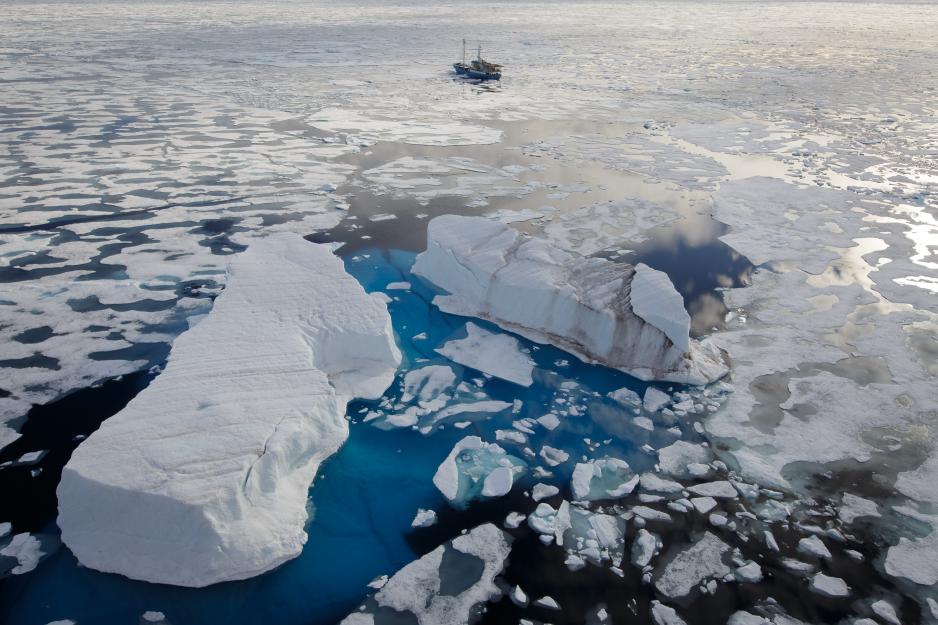The Arctic has a limited role in COP21

The Arctic has a limited role in Decembers COP21 in Paris. Here is the Norwegian Polar Institutes research vessel RV "Lance" north of Svalbard during polar bear counting this August. (Photo: Nick Cobbing)
Despite recent focus on effects of climate change in the Arctic by leading Arctic nations, there is reason to believe that the region will not be addressed during the upcoming climate negotiations in Paris. In a US Congressional hearing on the Arctic this week climate change was left unmentioned.
Despite recent focus on effects of climate change in the Arctic by leading Arctic nations, there is reason to believe that the region will not be addressed during the upcoming climate negotiations in Paris. In a US Congressional hearing on the Arctic this week climate change was left unmentioned.
In just under two weeks leaders from all over the world will meet in Paris to draft a new agreement on how to tackle climate change. The goal of COP21 (21st Conference of the Parties to the United Nations Convention on Climate Change) is to create an ambitious agreement for emissions reductions commitments for the post-2020 period.
Many Arctic nations and groups have signalized that an ambitious agreement is critical for the region, which is particularly sensitive to climate change. However, there has been few explicit mentions of the Arctic in the ongoing negotiations towards Paris, and there is reason to believe that the region will not be addressed during the conference.
A sensitive region
The effects of global warming on the Arctic region are dramatic, and will have consequences all over the world if the global temperature continues to rise.
The Arctic is warming at a faster-than-average-rate compared to the rest of the world. The main reason is that the melting of sea ice means that there is less ice to reflect sunshine back into space, making the Arctic Ocean even warmer.
Additionally, thawing permafrost leads to releases of carbon and methane into the air, contributing to global greenhouse gas emissions. These factors lead back to more melting of sea ice, which leads to rising sea levels, having a dramatic impact on other areas of the world.
Game-changing climate action
There has been significant focus to climate change in the Arctic by some Arctic states during the second half of 2015. As the US took over the chairmanship of the Arctic Council in April this year, Secretary Kerry announced that climate change would be one of the top priorities under the US leadership.
In the end of August President Obama went on an unprecedented trip to Alaska to participate in the GLACIER conference to bring attention to the implications of climate change.
The Nordic countries have also brought attention to the implications of climate change in the Arctic, most notably by a joint declaration signed by Nordic ministers in the end of October. The declaration calls for game-changing climate action during COP21 and specifically mentions concern for the Arctic. The Nordic countries will be organizing a series of events during COP21 under the heading “New Nordic Climate Solutions.”
President Putin has also expressed the importance of keeping a balance between economic activity and environmental protection in the Arctic. With almost a third of the country belonging to the Far North, Russia is particularly vulnerable to warming of the Arctic.
Last week Russia’s Minister of Natural Resources Sergey Donoscov said that the country will start implementing mitigation measures on domestic industry over the next few years.
COP21
Despite actions by the executive leadership in the US to bring focus to global warming in the Arctic, it may seem like members of Congress have already forgotten about climate change. In a Congressional hearing on US Arctic policy last week, the impacts of climate change in the region were barely mentioned.
The representatives from Congress were more interested in the economic potential, the lack of US icebreakers and the role of Russia and China in the region.
Read more (norwegian): Arktishøring i Kongressen: Mye sikkerhet, lite klima
Despite the current focus on the implications of climate change by Arctic states, the prospect of getting an international agreement that includes explicit adaptions and measures for the Arctic are not good. Even though the change happening in the region has global impacts, the measures and adaptions will be addressed in regional forums for now.
Although there is consensus that the Arctic is a particularly sensitive region, there is little room for states to bring this up during the UNFCCC climate talks. Under this process there are few opportunities to address specific geographic regions. Traditionally there have also been limited opportunities for industrialized countries to bring up specific vulnerabilities due to the differentiated roles of developed and developing countries. For industrialized nations (such as all Arctic states are) vulnerabilities to climate change is seen primarily as a matter of domestic policies.
Additionally, the Arctic region is not mentioned in the negotiating text for the Paris conference, which covers the substantive content of the new agreement that will be made in December.
In other words, the Arctic has not been a key issue in the meetings leading up to COP21, except for as a basis for scientific evidence of climate change. Nevertheless, an international agreement with significant commitments could help stabilize the temperature and thus have a positive impact on the region. This, in the end, depends on whether the commitments are significant enough and ultimately if they are upheld.
